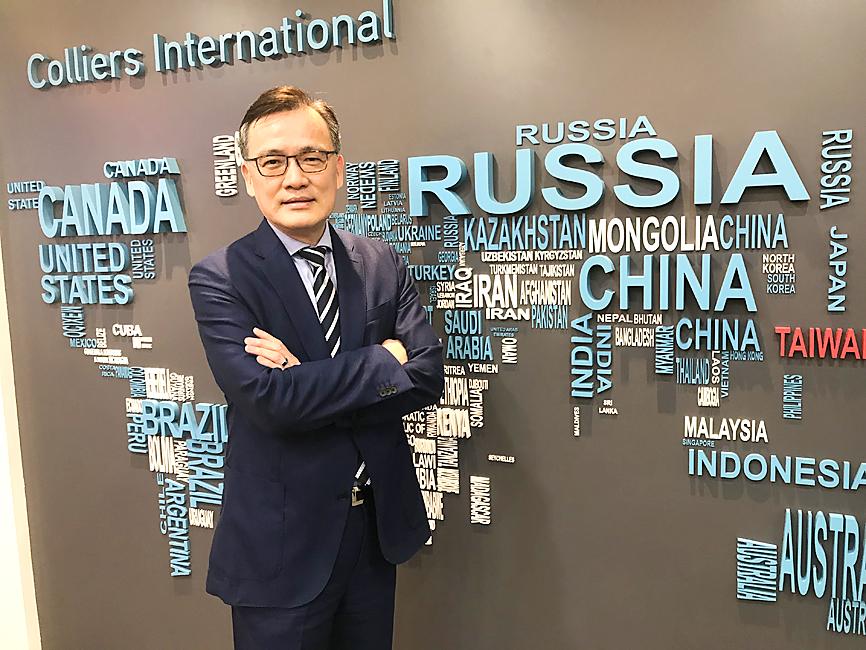Demand for warehouses and logistics facilities has spiked in the past few years, aided by booming online shopping and port congestion amid the COVID-19 pandemic, Colliers International Taiwan (高力國際) said yesterday.
The past three years have seen 22 major transactions of warehouses and logistics facilities valued at NT$29.94 billion (US$1.05 billion) and covering 209,100 ping (690,030m2), the size of 2.3 Daan Forest Parks in Taipei, the property broker said.
Colliers Taiwan managing director Andrew Liu (劉學龍) identified three investment approaches in warehouses and logistics facilities, namely by taking up the role of landlords, service providers and operators.

Photo: Hsu Yi-ping, Taipei Times
Cathay Life Insurance Co (國泰人壽) and Chunghwa Post Co (中華郵政) are landlords to several warehouses and logistics facilities that generate rental incomes equal to 4 percent of annual returns, Liu said.
Ally Logistic Property Co (永聯物流) offers warehousing and logistics solutions for clients in electronics and retail sectors, a business model that provides higher returns than rents, Liu said.
Meanwhile, companies such as food and beverage conglomerate Uni-President Enterprises Corp (統一企業), supermarket chain operator PX Mart Co Ltd (全聯實業) and e-commerce operator Momo.com Inc (富邦媒體) buy plots and build their own warehouses and logistics facilities to meet operational needs, Liu said, adding that their business scales are large and their pockets deep enough to warrant such a strategy.
Most warehousing deals are concentrated in Taoyuan’s Guanyin (觀音), Gueishan (龜山), Dasi (大溪) and Lujhu (蘆竹) districts; New Taipei City’s Wugu District (五股); Keelung; and Hsinchu’s Hukou Township (湖口), Collier Taiwan said.
Solid demand has pushed up industrial plot prices by 40 percent since 2018, the broker said.
Warehouses and logistics facilities are sparse in Taichung, Tainan and Kaohsiung, as well as Changhua County, but their numbers might increase in central and southern Taiwan in the coming years on the back of emerging industrial clusters and land scarcity in the north, Collier Taiwan said.
Industrial plots of more than 10,000 ping and near highway entrances are ideal sites for warehouses and logistics facilities, it said.
Apart from Cathay Life, Nan Shan Life Insurance Co (南山人壽) and Transglobe Life Insurance Co (全球人壽) also have displayed investment interest in warehouses and logistics facilities, it said.

MARKET LEADERSHIP: Investors are flocking to Nvidia, drawn by the company’s long-term fundamntals, dominant position in the AI sector, and pricing and margin power Two years after Nvidia Corp made history by becoming the first chipmaker to achieve a US$1 trillion market capitalization, an even more remarkable milestone is within its grasp: becoming the first company to reach US$4 trillion. After the emergence of China’s DeepSeek (深度求索) sent the stock plunging earlier this year and stoked concerns that outlays on artificial intelligence (AI) infrastructure were set to slow, Nvidia shares have rallied back to a record. The company’s biggest customers remain full steam ahead on spending, much of which is flowing to its computing systems. Microsoft Corp, Meta Platforms Inc, Amazon.com Inc and Alphabet Inc are

INVESTOR RESILIENCE? An analyst said that despite near-term pressures, foreign investors tend to view NT dollar strength as a positive signal for valuation multiples Morgan Stanley has flagged a potential 10 percent revenue decline for Taiwan’s tech hardware sector this year, as a sharp appreciation of the New Taiwan dollar begins to dent the earnings power of major exporters. In what appears to be the first such warning from a major foreign brokerage, the US investment bank said the currency’s strength — fueled by foreign capital inflows and expectations of US interest rate cuts — is compressing profit margins for manufacturers with heavy exposure to US dollar-denominated revenues. The local currency has surged about 10 percent against the greenback over the past quarter and yesterday breached

The US overtaking China as Taiwan’s top export destination could boost industrial development and wage growth, given the US is a high-income economy, an economist said yesterday. However, Taiwan still needs to diversify its export markets due to the unpredictability of US President Donald Trump’s administration, said Chiou Jiunn-rong (邱俊榮), an economics professor at National Central University. Taiwan’s exports soared to a record US$51.74 billion last month, driven by strong demand for artificial intelligence (AI) products and continued orders, with information and communication technology (ICT) and audio/video products leading all sectors. The US reclaimed its position as Taiwan’s top export market, accounting for

MARKET FACTORS: Navitas Semiconductor Inc said that Powerchip is to take over from TSMC as its supplier of high-voltage gallium nitride chips Taiwan Semiconductor Manufacturing Co (TSMC, 台積電) yesterday in a statement said that it would phase out its compound semiconductor gallium nitride (GaN) business over the next two years, citing market dynamics. The decision would not affect its financial targets announced previously, the world’s biggest contract chipmaker said. “We are working closely with our customers to ensure a smooth transition and remain committed to meeting their needs during this period,” it said. “Our focus continues to be on delivering sustained value to our partners and the market.” TSMC’s latest move came unexpectedly, as the chipmaker had said in its annual report that it has